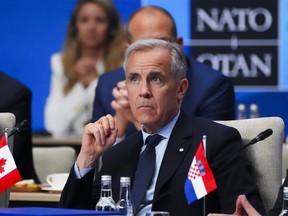The digital services tax was another policy-driven tax debacle

The digital services tax was another policy-driven tax debacle

Article content
The amount of spending that Prime Minister Mark Carney committed to last month is eye-watering.
THIS CONTENT IS RESERVED FOR SUBSCRIBERS ONLY
Subscribe now to read the latest news in your city and across Canada.
- Exclusive articles from Barbara Shecter, Joe O'Connor, Gabriel Friedman, and others.
- Daily content from Financial Times, the world's leading global business publication.
- Unlimited online access to read articles from Financial Post, National Post and 15 news sites across Canada with one account.
- National Post ePaper, an electronic replica of the print edition to view on any device, share and comment on.
- Daily puzzles, including the New York Times Crossword.
SUBSCRIBE TO UNLOCK MORE ARTICLES
Subscribe now to read the latest news in your city and across Canada.
- Exclusive articles from Barbara Shecter, Joe O'Connor, Gabriel Friedman and others.
- Daily content from Financial Times, the world's leading global business publication.
- Unlimited online access to read articles from Financial Post, National Post and 15 news sites across Canada with one account.
- National Post ePaper, an electronic replica of the print edition to view on any device, share and comment on.
- Daily puzzles, including the New York Times Crossword.
REGISTER / SIGN IN TO UNLOCK MORE ARTICLES
Create an account or sign in to continue with your reading experience.
- Access articles from across Canada with one account.
- Share your thoughts and join the conversation in the comments.
- Enjoy additional articles per month.
- Get email updates from your favourite authors.
THIS ARTICLE IS FREE TO READ REGISTER TO UNLOCK.
Create an account or sign in to continue with your reading experience.
- Access articles from across Canada with one account
- Share your thoughts and join the conversation in the comments
- Enjoy additional articles per month
- Get email updates from your favourite authors
Sign In or Create an Account
or
Article content
The $9-billion boost to our defence budget and the pledge to the North Atlantic Treaty Organization (NATO) to eventually spend five per cent of our country’s gross domestic product annually amount to billions in the short term and hundreds of billions in the longer term. All these spending commitments have been made without presenting a spring budget.
Article content
Article content
Asked by a reporter at The Hague Summit about how Canada will pay for all the spending, acknowledging the concerns by the Parliamentary Budget Officer (PBO) about sustainability, Carney made a visible eye roll before proceeding to give a non-answer. He defaulted to his usual talking points about how the government is committed to growing the economy, balancing the operational budget within three years and investing in Canada.
Article content
Article content
Watch Mark Carney not answer the question regarding if Canadians will see tax increases to cover his excessive spending. First Carney gives an eye roll then before he makes his statement he touches his face, that has always been his tell when he’s about to tell a lie. Even note… pic.twitter.com/GPKqwyaTG2
— Ryan Gerritsen🇨🇦🇳🇱 (@ryangerritsen) June 25, 2025
Article content
The commitment to balance the operational budget sounds good, but it’s not. It’s a simple accounting trick designed to mask spending by moving costs to the “capital budget.” It doesn’t help reduce spending in the least and doesn’t consider the increased debt-servicing costs that will result from the increased, but less visible, spending.
Article content
By signing up you consent to receive the above newsletter from Postmedia Network Inc.
Article content
The PBO report the reporter was about our Canada’s year-to-date finances. It had the following eye-catching quote:
Article content
“Unlike the previous fiscal anchor, the government has not defined how the new operating budget targets will be measured. Specifically, there is no commonly accepted definition of what is defined as “operating” or “non-operating/capital” spending. Hence, PBO is unable to assess whether the government’s recent fiscal policy initiatives presented in Parliament … are consistent with achieving its new fiscal objective.
Article content
“PBO also notes that the government could fulfill its operating budget goals, and yet at the same time the federal debt-to-GDP ratio could grow because of additional borrowing for non-operating spending (for example, new acquisitions of weapons systems for the Canadian military). This means that the government could achieve its fiscal objective and yet be fiscally unsustainable.”
Article content
Article content
The PBO is bang on. Regardless of how you account for such additional spending — operating versus capital — the amounts need to come from somewhere, either in the form of increased revenues — taxes — or cuts in government spending. Or both.
Article content
Article content
I believe there is a lot of room to significantly cut expenditures without affecting core essential services such as health transfers, support for the vulnerable, defence, etc., especially when you consider how fast expenditures have been growing. Ten years ago, federal expenditures were $250.1 billion. For this coming year, it’s expected to be $486.9 billion — a 94.7% increase (revenues haven’t kept pace).
Article content
However, my belief would need to be proven by a significant audit of such expenditures, not endless academic studies that suggest the government has plenty of fiscal capacity to continue spending.
Article content
Without reining in growing expenditures, there is only one way to go: increased revenues, meaning more taxes. Former United States president Ronald Reagan once quipped, “If it moves, tax it. If it keeps moving, regulate it. And if it stops moving, subsidize it.”







